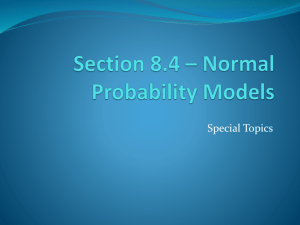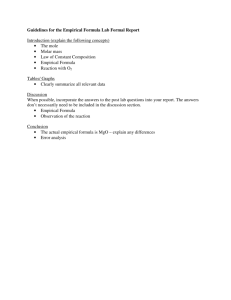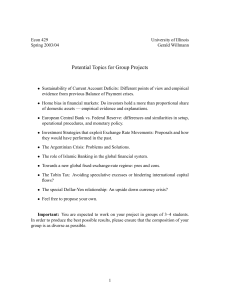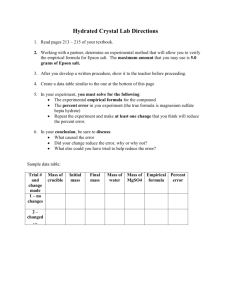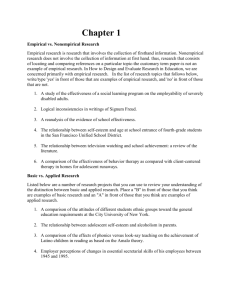Empirical Rule
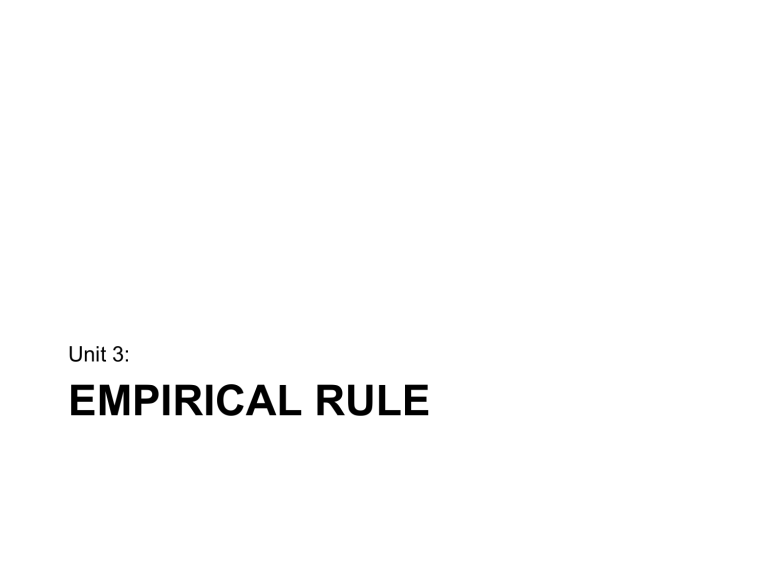
Unit 3:
EMPIRICAL RULE
What does a population that is normally distributed look like?
Empirical Rule
68%
95%
99.7%
68-95-99.7% RULE
Empirical Rule
68%
95%
99.7%
68-95-99.7% RULE
Empirical Rule
68%
95%
99.7%
68-95-99.7% RULE
Empirical Rule
68%
95%
99.7%
68-95-99.7% RULE
Empirical Rule —restated
68% of the data values fall within 1 standard deviation of the mean in either direction
95% of the data values fall within 2 standard deviation of the mean in either direction
99.7% of the data values fall within 3 standard deviation of the mean in either direction
Remember values in a data set must appear to be a normal bell-shaped histogram, dotplot, or stemplot to use the Empirical
Rule!
Average American adult male height is 69 inches (5’ 9”) tall with a standard deviation of
2.5 inches.
What does the normal distribution for this data look like?
Empirical Rule--
Let H~N(69, 2.5)
What is the likelihood that a randomly selected adult male would have a height less than 69 inches?
Answer: P(h < 69) = .50
P represents Probability h represents one adult male height
Using the
Empirical Rule
Let H~N(69, 2.5)
What is the likelihood that a randomly selected adult male will have a height between 64 and 74 inches?
P(64 < h < 74) = .95
In Calculator:
2 nd Vars: normalcdf(lower, upper, mean, std. dev.)
Using the
Empirical Rule
Let H~N(69, 2.5)
What is the likelihood that a randomly selected adult male will have a height between 64 and 74 inches?
In Calculator:
2 nd Vars normalcdf(lower, upper, mean, std. dev.)
For this example:
2 nd Vars
Normalcdf(64, 74, 69, 2.5) = .95
Using Empirical Rule--
Let H~N(69, 2.5)
What is the likelihood that a randomly selected adult male would have a height of less than 66.5 inches?
= .16
Using Empirical Rule--
Let H~N(69, 2.5)
What is the likelihood that a randomly selected adult male would have a height of greater than 74 inches?
= .025
Using Empirical Rule--
Let H~N(69, 2.5)
What is the probability that a randomly selected adult male would have a height between 64 and
76.5 inches?
= .9735
Journal Prompt - Wednesday
A set of values has a normal distribution. The mean data is 120, and the standard deviation is 20.
1. Create the normal distribution for this data.
2. 68% falls between:______ & ________
3. 95% falls between:______ & ________
4. 99.7% falls between:______ & _______
5. What percent falls below 120?
6. What percent falls between 115 and 128?
7. What percent falls below 90?
8. What percent falls above 150?
Empirical Rule
&
Z-Score
About 68% of data values in a normally distributed data set have z-scores between –1 and 1; approximately 95% of the values have z-scores between –2 and 2; and about 99.7% of the values have z-scores between
–3 and 3.
Find P(z < 1.85) normalcdf(-1
E
99, 1.85, 0, 1)
.9678
-3 -2 -1 0 +1
1.85
+2 +3
Find P(z > 1.85)
Normalcdf(1.85, 1
E
99, 0, 1)
.9678
-3 -2 -1 0 +1
1.85
+2 +3
Find P( -.79 < z < 1.85) normalcdf(-.79, 1.85, 0, 1)
-3 -2 -1
-.79
0 +1 +2
1.85
+3
N(70,5)
• Draw normal curve (& label)
• Boundaries for middle 68%
• Boundaries for middle 95%
• Boundaries for middle 99.7%
• % above 85
• % below 68
• % between 63 and 74
• Cutoff for lower 7%
• Cutoff for upper 13 %
